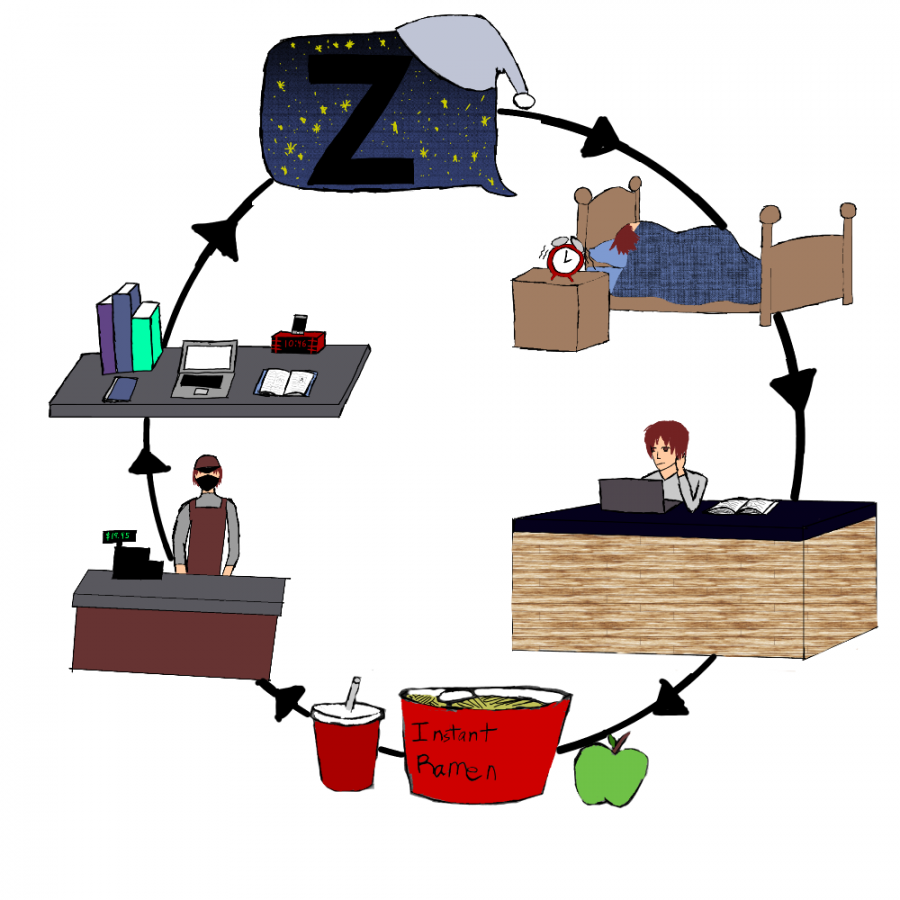Junior Garrett Boren often goes to bed at 12 in the morning and wakes up at 5 a.m. He doesn’t get home until 6:30 p.m., because of his play rehearsal. He then attempts to finish all of his homework for two A.P. classes, Pre-Calculus, practice songs and choreography for the spring musical, practice for Rythmix, and attempt to get enough sleep to do it all again the following day.
Even this midnight bedtime often is not enough to finish all the work.
“If I don’t finish my homework past midnight, I’m going to bed,” said Boren. “I typically average five hours of sleep.”
Schedules like these, which may have been described as atypical in the past, are becoming more commonplace today, as some students spend nearly all of their available time going to school, doing homework, or practicing sports or other extracurriculars.
Such schedules have led to a phenomenon where many people believe they “have no time”; in fact, 65 percent of West Albany students say they “don’t have enough time.” Boren is also not alone in averaging 5 hours of sleep; 35 percent of students say they get five-six hours of sleep a night, with 90 percent of all respondents getting the National Sleep Foundation recommendation of eight hours.
Lucas Risinger, a junior AVID teacher, says he hears the complaint of not having enough time multiple times a day, from every class. Risinger believes the cause of this is partially just being busy, but also the feeling of time passing and the relativity of time.
“Everyone kind of has different personal needs,” said Risinger, “and that affects how time will work for them.”
For instance, explained Risinger, one person may feel they need two hours to sit on the couch and do nothing, whereas another person might scoff at this and think it’s a blatant waste of time. Risinger believes that it is possible for those tendencies to change.
“In general, students don’t know how much they can do in a day,” said Risinger. “You start to learn that in high school, you really start to learn that once you take AP classes, and then you learn even more once you get into college and you have even less time.”
But why is it even important to feel like time is plentiful? After all, if the work is getting done, and tardiness is not an issue, then why does that even matter?
“When you feel you don’t have enough time to do things, you feel anxiety that often manifests in a feeling of drowning,” says Risinger. “And then that, of course, affects your performance. And so then you stopped doing as well, so then you have even less time for stuff, and it’s a vicious positive feedback loop.” According to Risinger, this anxiety can then translate into depression, mild or severe.
According to the CDC, 28.5 percent of all people aged 13-19 experienced an episode of depression (defined as a period characterized by depression symptoms that last for two weeks or more) in 2012.
So how can a person get their work done more efficiently? Risinger recommends to-do lists, as he believes that this is an easy way to organize information.
According to Risinger, another way to earn more time is to frame things in a way that makes it seem easier. One way to do this is to take the time allotted and break up large tasks into smaller ones, making it easier to do those things.
However, in the end, the really important thing about time management is to focus on yourself, says Risinger.
“Identify exactly what it is you need to be happy, and to be successful. And if you prioritize those, that is time well spent… ‘what are you going to make time for.’”


